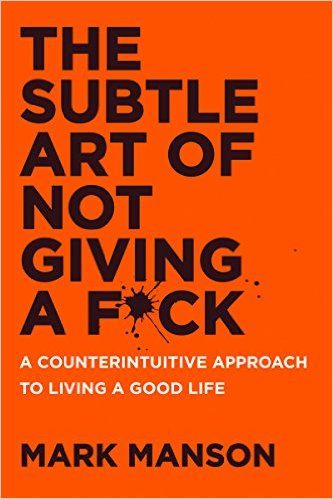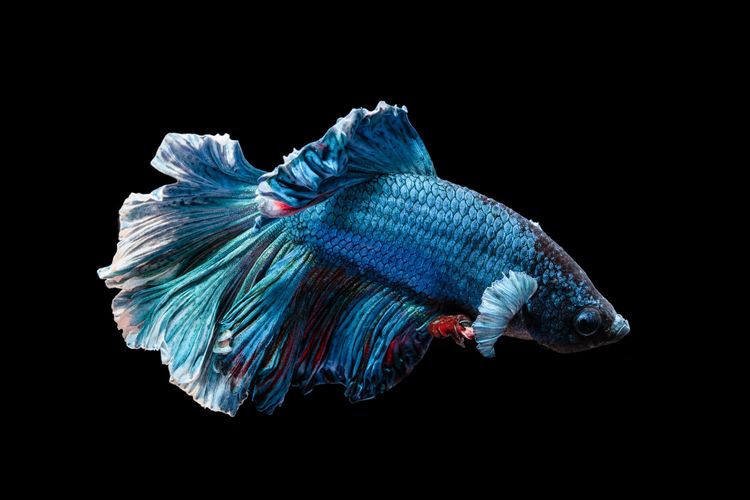The Subtle Art of Not Giving A Fuck by Mark Manson - Summary and Book Notes
Pragmatic and brutally honest advice in the self-help sea of useless feel-good bullshit.
Review
I was expecting recycled content from Manson's blog and The How To Not Give a Fuck Subreddit, but there's plenty of new material here. The book touches on interesting and often unsaid truths about our behavior and values. Manson writes well with occasional clunkiness but nothing gets in the way of a good read.

I recommend this book for anyone who is:
- Seeking to improve their lives
- Sick of positive messages which make you feel good but don't compel any lasting change.
Don't give any fucks? Buy this book on Amazon
=======
Quick Summary
The following are rough notes I took while reading. These are mostly paraphrased or quoted directly from the book.
Don't Try
The genius in Bukowski's work was ... his simple ability to be honest with himself--especially the worst parts of himself.
Conventional life advice focuses on what you lack.
Fixation on the positive only reminds us what we lack.
The world is constantly telling you the path is more, more, more.
The key to a good life is giving a fuck about only what is important.
Our society has bred a whole generation of people who believe that having negative experiences is not okay.
The desire for more positive experience is a negative experience. The acceptance of one's negative experience is a positive experience.
Everything worthwhile in life is won through surmounting the associated negative experience.
To not give a fuck is to stare down life's difficult challenges and still take action.
You can't be an important and life-changing presence for some people without also being a joke and an embarrassment to others.
If you don't find something meaningful [to give a fuck about], your fucks will be given to meaningless and frivolous causes.
This book is not a guide to greatness--greatness is merely an illusion in our minds, a made-up destination.
Happiness Is a Problem
We suffer because suffering is biologically useful.
Pain teaches us how to avoid mistakes in the future. This is what's so dangerous about a society that coddles itself.
Problems never stop; they merely get exchanged and/or upgraded. Happiness comes from solving problems.
Many self-help gurus pump you up while ignoring the underlying issue.
Negative emotions are a call to action. When you feel them you are supposed to do something.
What pain do you want in your life? What are you willing to struggle for?
Happiness requires struggle.
You Are Not Special
Adversity and failure are necessary for developing strong-minded and successful adults.
Entitled people can't acknowledge their own problems openly and honestly. Therefore they are incapable of improving their lives in any meaningful way.
The problem with my home life wasn't the horrible things that were said or done; it was all of the horrible things that needed to be said and done but weren't.
People who feel inferior and unworthy of the world are just as entitled as narcissistic ass-hats. Making yourself out to be constantly victimized requires selfishness.
Realizing that your problems are not special is the first and most important step toward solving them.
It's a statistical improbability that any single person will be an extraordinary performer in all of many areas of their life.
Information overload has conditioned us to believe that exceptionalism is the new normal.
Being 'average' has become the new standard for failure.
Exceptional people become amazing because they're obsessed with improvement.
The vast majority of your life will be boring and not noteworthy, and that's okay. Accept this, and you will have a growing appreciation for life's basic experiences. These are what actually matter.
The Value of Suffering
We all have emotional blind spots.
Ask why we feel certain emotions.
Ask why do I consider this to be a success/failure?
Why do you feel such a need to be rich in the first place?
Because we are apes, we measure ourselves against others.
Our values determine the metrics by which we measure ourselves and others.
If you want to change how you see your problems, you have to change what you value and/or how you measure failure/success.
#####Shitty Values#####
- Pleasure
- Material Success
- Always Being Right
- Staying Positive
Our brains are wrong almost constantly.
Always being right means you'll never learn.
Assume you are ignorant.
Express negative emotions in a healthy manner and in a way that aligns with your values.
Emotions are just feedback. Anger is natural. Punching people in the face is the problem.
######Good Values Are#####
- reality-based
- socially constructive
- immediate and controllable
Examples of good values: honesty, innovation, vulnerability, standing up for oneself and others, self-respect, curiosity, charity, humility, creativity.
Values are about prioritization. What values do you prioritize above all else?
When we have poor values we give fucks about things that don't matter.
You Are Always Choosing
When we feel we're choosing our problems, we feel empowered. Otherwise, we feel victimized and miserable.
We don't always control what happens to us. But we always control how we interpret what happens to us, as well as how we respond.
With great responsibility comes great power.
We are responsible for experiences that aren't our fault all the time.
Fault is past tense. Responsibility is present tense.
When people pass off responsibility to others through blame, they get a temporary high and feeling of moral righteousness.
This may be the first time in human history that every single demographic group has felt unfairly victimized simultaneously.
The biggest problem with victimhood chic is that it sucks attention away from actual victims.
"Outrage is like a lot of other things that feel good but over time devour us from the inside out...and we don't even consciously acknowledge that it's a pleasure" - Tim Kreider
Part of living in a democracy and a free society is that we all have to deal with views and people we don't necessarily like.
Change is as simple as choosing to give a fuck about something else. It's simple, not easy.
You're Wrong About Everything
I'm always wrong about everything, over and over and over again, and that's why my life improves.
Chip away at the ways we're wrong today so we can be a little less wrong tomorrow.
It's easier to sit in painful certainty that nobody appreciates your talents, than to actually test those beliefs and find out for sure.
Certainty is the enemy of growth.
We don't actually know what a positive or a negative experience is. Difficult and stressful moments end up being formative and motivating.
The human mind is quick to find patterns and bullshit that isn't real.
All beliefs are wrong--some are just less wrong than others.
Our mind will process experiences in a way that coheres with our previous experiences, feelings, and beliefs. When we run into situations where past and present don't cohere, instead of changing our minds it's easier to rationalize or invent false memories.
Trust yourself less.
You can do everything "right" and still be wrong if your values are fucked.
For individuals to feel justified in doing horrible things to others, they must feel an unwavering certainty in their own righteousness. (Racists, religious fanatics, rapists, etc).
The more you try to be certain about something the more uncertain and insecure you will feel.
Uncertainty is the root of all progress and growth.
To assume our values are perfect puts us in a dangerously dogmatic mindset.
Manson's Law of Avoidance: The more something threatens your identity, the more you will avoid it.
Change how you view yourself and then you can change.
Don't 'find yourself'. Never know who you are. That's what keeps you striving and discovering.
Define yourself in the simplest and most ordinary ways possible.
If you're sitting there, miserable day after day, then that means you're already wrong about something major in your life. Until you're able to question yourself to find it, nothing will change.
If it's down to you being screwed up, or everyone else being screwed up, the former is more likely.
Failure Is the Way Forward
Get rid of your fear of failure.
Fear of failure often comes from shitty values.
Better values are process-oriented (not goal oriented).
Pain makes us stronger, more resilient, more grounded.
Only when we feel intense pain are we willing to look at our values and question why they are failing us.
Pain is part of the process. It's important to feel it.
Some problems are funny in that the answer appears difficult if you have the problem, and easy to those who do not. The problem is avoidance of pain.
When you choose a new value you choose a new form of pain. Act despite it.
Life is about not knowing and doing something anyway.
If you're stuck on a problem, just start working on it. Even if you don't know what you're doing, the act of working on it will cause the right ideas to show up in your head.
Action isn't just the effect of motivation; it's also the cause of it.
Action -> Inspiration -> Motivation
Do something.
When success is merely any action, failure feels unimportant.
The Importance of Saying No
Travel...was replete with horizon-breaching experiences as well as superficial highs to numb my underlying pain.
The only way to achieve meaning and a sense of importance in one's life is through a rejection of alternatives, a narrowing of freedom, a choice of commitment to one place, one belief, or one person.
Does our bullshitty, fake-nice communication make us more insecure around each other? Worse at intimacy?
We need to reject something or we stand for nothing.
Part of having honesty is being comfortable with saying and hearing the word "no."
Unhealthy love-using each other as an escape. Healthy love is based on addressing their own problems with each other's support.
Healthy relationship:
each person accepts responsibility each person is willing to reject and be rejected by their partner
People in a toxic relationship will avoid responsibility for their own problems and/or take responsibility for their partner's problems.
Also applies to family relationships and friendships
Entitled people believe that if they constantly paint themselves as victims, someone will come along and save them.
Entitled people believe that if they "fix" or "save" their partner they will receive the love they always wanted.
Ironically, when presented with emotionally healthy people to date, [entitled people] feel bored or lack "chemistry"
Litmus test: If I refused, how would the relationship change? If my partner refused, how would the relationship change?
Need unconditional acceptance of each other (and each other's problems)
People with strong boundaries are not afraid of an argument or getting hurt.
Honesty is more important than feeling good all the time.
When our highest priority is to feel good or make our partner feel good all the time, nobody ends up feeling good.
Without conflict there can be no trust. No one trusts a yes-man.
When you're pursuing a wide breadth of experience, there are diminishing returns to each new adventure, person, or thing.
Commitment gives you freedom because you're no longer distracted by the unimportant and frivolous.
...And Then You Die
On the death of a friend: "Why do you care that I'm dead when you're still so afraid to live?"
In the face of death, there is no reason to ever give in to one's fear or embarrassment or shame, since it's all a bunch of nothing anyway.
"The Denial of Death" by Ernest Becker:
Death terror underlies everything we do
We are driven to do frivolous things to avoid facing our death
When we become comfortable with our death, we can choose our values more freely, unconstrained by quests for immortality and freed from dogma.
Confronting our mortality obliterates all the crappy values in life.
Our culture conflates great attention and great success. They are not the same.
"We're all going to die, all of us. What a circus! That alone should make us love each other, but it doesn't. We are terrorized and flattened by life's trivialities; we are eaten up by nothing." - Bukowski




Member discussion